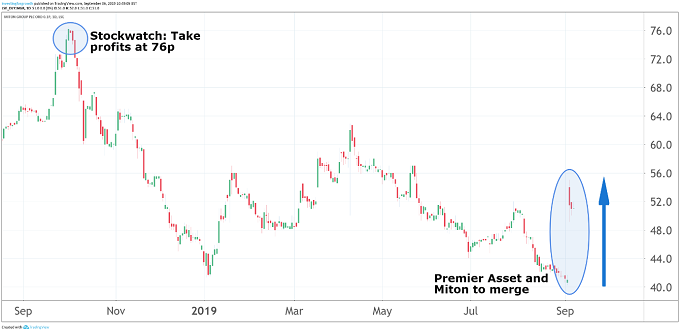Stockwatch: Reassessing an old favourite
Our companies analyst made 200% profit and called the top of the market for this share. But what now?
6th September 2019 10:52
by Edmond Jackson from interactive investor
Our companies analyst made 200% profit and called the top of the market for this share. But what now?

Is a £280 million all-share merger on AIM between Miton Group (LSE:MGR) and Premier Asset Management (LSE:PAM) driven by confidence – or more like a vital industry move, now that the bull market is fading and regulatory costs rising?
The formation of Premier Miton Group is so far chiefly propping Miton shares – up about 25% to 51p because the merger terms equate to 56.7p a share, including a 4.9p special dividend. Meanwhile, Premier has drifted a few pence to about 168p and now back to its end-2018 low.
I've drawn attention to Miton various times on the buy and sell tack, including at 25p in January 2015, along a rationale that the maturing bull market would favour a specialist small cap equities manager and operational gearing boost its profits.
This was verified by the table showing strong financial progress, although the stock wavered along the way, falling to 21p in mid-2016 then rallying to 76p by last October when I wrote it was time to lock in gains.
- Premier and Miton join forces in latest fund manager merger
- Cheapest quoted fund manager
- What to do with this AIM star?
I haven't overlooked Premier on grounds it was less worthy, rather preferring to limit drawing attention to smaller fund managers given they can be more exposed if another financial crisis materialises. Both these stocks falling back to where they started 2019, in line with fears for the global economy and domestic political chaos over a hard Brexit, shows it is hard to buck sentiment changes. Moreover, I suspect it reinforced to the boards at Miton and Premier, a radical initiative is required.
On the face of it, a logical move
The combined group is expected to have £11.5 billion assets under management, revenue of about £76 million and pre-tax profit of £25 million after yielding £7 million cost synergies over three years (albeit a one-off cost of £10 million) by combining operating platforms.
Premier shareholders will be in two-thirds ownership. The deal is promoted by "a compelling strategic and financial rationale" widening the product range, balancing it better between multi- and single-asset funds, achieving distribution synergies to sell those funds via complementary sales channels (Premier via IFA and online platforms, while Miton has strong contacts in wealth management) and greater scale to meet regulatory demands/costs instead of duplicating them.
The hope has to be that there is no falling out at the top after positions get shared out between Premier and Miton directors, and the resulting culture means talent wants to stay (also join) not move away. Such is always a risk with M&A in "people businesses".
Miton's inflows have indeed consolidated
Last March when reviewing its 2018 results – earnings per share (EPS) soared 45% to 4.5p - I was wary that such momentum (helped by operational gearing) was sustainable:
"It's easy to fret, they represent the culmination of a 10-year bull market fuelled by central banks expanding balance sheets (now contracting) and a buoyant global economy (now in doubt)."
Moreover, a 106% annual rise in net inflows over £1 billion had appeared to consolidate to ‘neutral' net flows for 2019 to date. In July, Miton declared half-year closing assets-under-management up a respectable 8% during the period to £4.7 billion, however details of the release showed this chiefly due to rising markets. Meanwhile, equity investors sat on their hands and multi-asset funds (sub 20% of total) saw a 9% outflow.
Quite whether calm before a storm or resumption of growth, only time will tell.
But, given listed companies are perennially expected to have growth initiatives, and it appears to me the consensus 2019 EPS forecast has softened to 4.1p from 4.5p achieved last year, management can hardly sit still.
My last call has recently been compromised
In March, I concluded Miton shares remained attractive at 58p given the cash generative nature of fund management (see the strong cash flow numbers in the table versus scant capital expenditure needs). However, I underestimated the extent that small cap shares in particular are in the grip of market sentiment.
Miton rose to 62p in April but trended downwards thereafter as US/China trade tensions exploded, reaching 41p a few days ago where the implied yield was near 6%. Although a short timescale, it's still saying Miton- as-it-stands, has run into challenges. A radical revision of operating economics therefore makes good sense.

Source: TradingView Past performance is not a guide to future performance
Respecting how the environment and sentiment have changed however, no fund manager is likely to rebound soon. I think broker Peel Hunt chooses its words carefully in saying that "assuming cost synergies are delivered, the scale of the group should help the rating of the enlarged group going forward."
Comparing price/earnings (PE) ratings, Miton and Premier both trade on forward multiples around 11 times, while £1.6 billion Jupiter Fund Management (LSE:JUP) is on 12 times with forecasts similarly expecting a modest slowdown in earnings this year. And £0.9 billion Brewin Dolphin Holdings (LSE:BRW) is on 13 times as wealth management is expected more resilient than fund sales.
But recessionary fears mean a dour mood in financial stocks generally. Jupiter and Brewin are priced for yields of 7.3% and 5.6% respectively, the market currently judging this as fair compensation for holding risks.
| Miton Group - financial summary | |||||||
|---|---|---|---|---|---|---|---|
| year ended 31 Dec | Estimates | ||||||
| 2013 | 2014 | 2015 | 2016 | 2017 | 2018 | 2019 | |
| Turnover (£ million) | 28.0 | 27.0 | 22.0 | 24.1 | 27.8 | 36.2 | 29.4 |
| IFRS3 pre-tax profit (£m) | 0.7 | -5.5 | 2.1 | 4.3 | 6.2 | 8.9 | |
| Normalised pre-tax profit (£m) | 1.8 | 6.8 | 2.5 | 4.9 | 6.8 | 9.2 | 7.1 |
| Operating margin (%) | 6.1 | 24.9 | 11.0 | 20.1 | 24.4 | 25.4 | |
| IFRS3 earnings/share (p) | 1.1 | 4.6 | 0.9 | 2.3 | 3.1 | 4.5 | |
| Normalised earnings/share (p) | 1.0 | 2.3 | 0.9 | 2.2 | 3.2 | 4.5 | 4.1 |
| Price/earnings multiple (x) | 11.3 | 12.4 | |||||
| Historic annual average P/E (x) | 37.2 | 5.5 | 29.4 | 16.8 | 16.2 | ||
| Cash flow/share (p) | 3.1 | 2.0 | 0.7 | 5.6 | 3.9 | 6.7 | |
| Capex/share (p) | 0.2 | 0.1 | 0.0 | 0.0 | 0.0 | 0.1 | |
| Dividend per share (p) | 0.5 | 0.6 | 0.7 | 1.0 | 1.4 | 2.0 | 2.2 |
| Dividend yield (%) | 3.9 | 4.3 | |||||
| Covered by earnings (x) | 2.0 | 3.8 | 1.3 | 2.2 | 2.3 | 2.3 | 1.9 |
| Net tangible assets per share (p) | 1.8 | 8.3 | 9.4 | 11.1 | 10.3 | 11.9 | |
| Source: Company REFS and Miton accounts |
Let the merger bed down
I don't see this broad sentiment changing much in the near term and, with fresh money, it makes sense to see how the integration proves. The market will quite likely suspend judgment until it sees results evolving, in terms of pricing for PE and yield.
The merged group's chairman, also chief executive, will transplant from Guildford-based Premier, the finance director being Miton's current chief operating officer in London – where group head office will be based - and non-executive directors will be a combination from both. You’d hope they can avoid fireworks, but it may be wise to wait and see how this merger works for all employees.
Analysts at finnCap are enthusiasts for the deal, partly because it "mitigates key man risk" although unless Gervais Williams – the public face of Miton - fell under a bus he was unlikely to go elsewhere. Owning nearly 9% of Miton as its managing director, he will be in charge of equity investment teams at the enlarged group. I wouldn't regard Gervais seemingly not on the new board as a demotion, more like his sensibly focusing on stocks than plc issues, and, anyway, Premier will be in two-thirds equity ownership.
I'd also qualify this broker's claim about how enhancing fund distribution is "the golden rule for success in this industry": from a client perspective risk-adjusted fund performance is key, hence another reason to see how this pans out for the merged group.
Yet, ultimately the crux for fund/wealth management stocks is people's appetite for the assets they offer, where sentiment is now cautious - and justifiably so. I think patience may pay off here, with fresh money better-to-wait, while existing shareholders can take heart that the economics of fund management are being enhanced. And, in the long run, it’s a nicely cash generative industry for dividends, with capital growth typically when markets rise. Hold.
Edmond Jackson is a freelance contributor and not a direct employee of interactive investor.
These articles are provided for information purposes only. Occasionally, an opinion about whether to buy or sell a specific investment may be provided by third parties. The content is not intended to be a personal recommendation to buy or sell any financial instrument or product, or to adopt any investment strategy as it is not provided based on an assessment of your investing knowledge and experience, your financial situation or your investment objectives. The value of your investments, and the income derived from them, may go down as well as up. You may not get back all the money that you invest. The investments referred to in this article may not be suitable for all investors, and if in doubt, an investor should seek advice from a qualified investment adviser.
Full performance can be found on the company or index summary page on the interactive investor website. Simply click on the company's or index name highlighted in the article.
Disclosure
We use a combination of fundamental and technical analysis in forming our view as to the valuation and prospects of an investment. Where relevant we have set out those particular matters we think are important in the above article, but further detail can be found here.
Please note that our article on this investment should not be considered to be a regular publication.
Details of all recommendations issued by ii during the previous 12-month period can be found here.
ii adheres to a strict code of conduct. Contributors may hold shares or have other interests in companies included in these portfolios, which could create a conflict of interests. Contributors intending to write about any financial instruments in which they have an interest are required to disclose such interest to ii and in the article itself. ii will at all times consider whether such interest impairs the objectivity of the recommendation.
In addition, individuals involved in the production of investment articles are subject to a personal account dealing restriction, which prevents them from placing a transaction in the specified instrument(s) for a period before and for five working days after such publication. This is to avoid personal interests conflicting with the interests of the recipients of those investment articles.